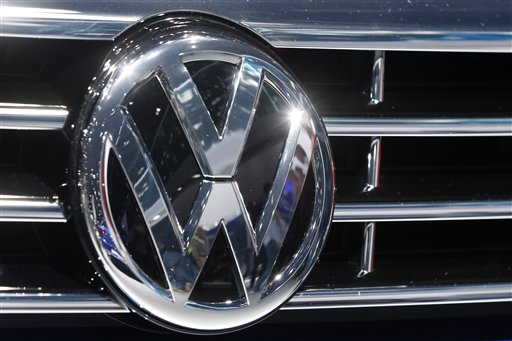Volkswagen scandal touches nerve center of German economy

The VW Logo is photographed at a car at the Car Show in Frankfurt, Germany, Tuesday, Sept. 22, 2015. Volkswagen has admitted that it intentionally installed software programmed to switch engines to a cleaner mode during official emissions testing. The software then switches off again, enabling cars to drive more powerfully on the road while emitting as much as 40 times the legal pollution limit. AP Photo
BERLIN, Germany—The pollution cheating scandal that has engulfed auto giant Volkswagen touches one of the main nerve centers of the German economy, given the importance of the car sector both politically and economically.
READ: Volkswagen admits 11 million cars have emissions cheating device
Germany’s mighty automobile sector includes the world’s biggest and best-known names, from VW itself to high-end makers like BMW, Daimler/Mercedes-Benz, and Opel, the German arm of US giant General Motors.
But it also includes some of the world’s leading parts suppliers, such as Bosch, Continental and ZF Friedrichshafen as well as myriad small and medium-sized enterprises all along the value chain.
READ: Volkswagen CEO: ‘I am endlessly sorry’ brand is tarnished
The sector clocked up combined annual sales of 385 billion euros ($430 billion) last year, or 14 percent of Germany’s gross domestic product (GDP).
Already some industry observers, such as analysts at CMC Markets, are expressing concern about the “spill-over effects” the Volkswagen scandal will have on the wider German economy in the weeks and months ahead.
More than five million cars rolled off the production line in Germany last year. Europe’s top economy is the fourth biggest producer of cars in the world after China, the United States and Japan. And it is the leader in Europe.
‘One in seven jobs’
Several years ago, Chancellor Angela Merkel said the one in every seven jobs in Germany were “directly or indirectly” linked to the sector.
The estimate is still freely bandied around today, even if it is a touch exaggerated.
Strictly speaking, the sector employed around 770,000 people last year, out of a total working population of more than 40 million.
Around a third of the sector’s turnover is generated in Germany, while the other two thirds comes from abroad.
Cars are Germany’s top export, accounting for 18 percent of the value of total exports last year. China, in particular, is one of the biggest customers for German cars.
On the stock exchange, no other sector is more widely represented on Frankfurt’s blue-chip DAX 30 index, with the three big makers VW, Daimler and BMW, as well as parts manufacturer Continental having a combined market capitalisation of 225 billion euros. And it was even higher before the meltdown in Volkswagen shares this week in the wake of the scandal.
Germans love their cars and they are particularly fond of German cars, which made up two thirds of all new registrations in the country last year.
A revolving door?
Ties between the auto sector and politicians are traditionally very close, too, and Volkswagen serves as a prime example.
The northern state of Lower Saxony, where the group is headquartered, holds a 20 percent stake in the carmaker.
The regional state premier and his finance minister both sit on Volkswagen’s supervisory board.
Peter Hartz, a one-time advisor to former Chancellor Gerhard Schroeder who gave his name to the swingeing labour market reforms, was a former head of personnel at the group.
And more recently, former Merkel advisor Eckart von Klaeden, became a lobbyist at Daimler. The switch was the target of a judicial investigation but nothing ever came of it.
Aware of the sector’s importance and weight, Merkel is keen to look after its interests—too much so, for some observers.
While keen to see herself as a “chancellor of the climate,” she has argued against strict European emission limits, much to the ire of non-government organizations.
“People have known for years that the diesel models of almost all the large manufacturers pollute a great deal more than is allowed under testing, but the politicians don’t do anything about it,” complained Daniel Moser of Greenpeace Germany.
“The fraternizing between politicians and the automobile industry is at the expense of people’s health,” he said.
Other critics have pointed out the slow speed with which the sector has embraced the electric engine, which remains very much a niche segment in Germany.